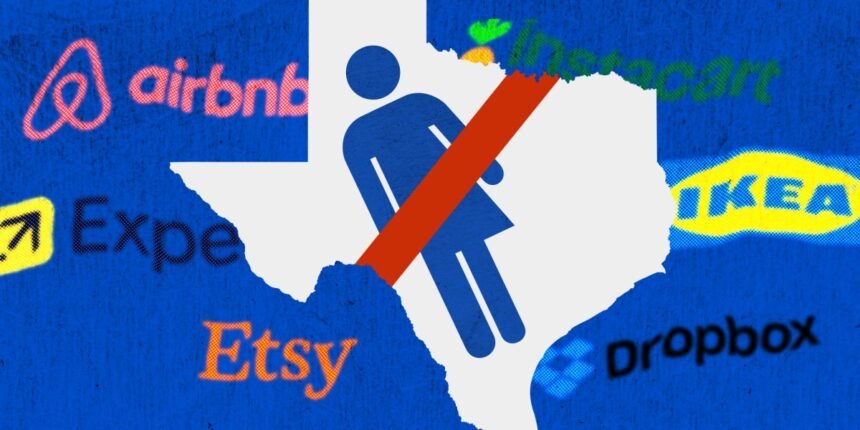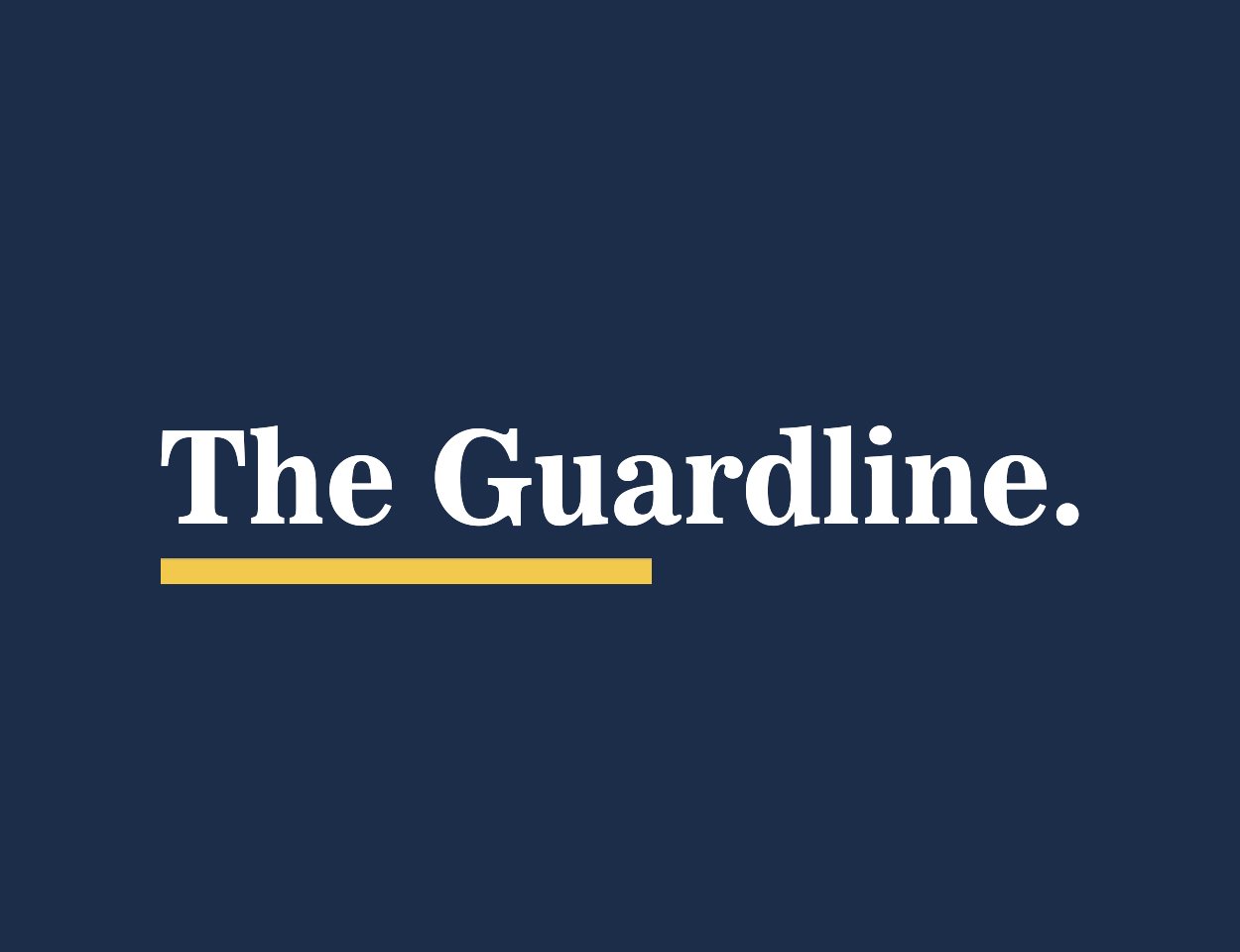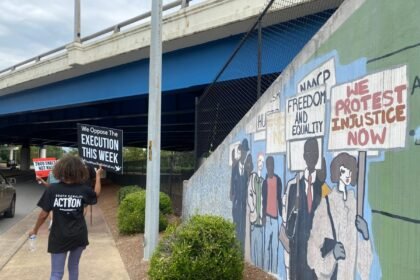The Guardline
In the weeks after North Carolina’s Republican-led state legislature passed its infamous 2016 “bathroom bill” — banning transgender people from using the bathroom aligned with their gender — major companies and their CEOs tripped over themselves to denounce it.
PayPal canceled its planned expansion into North Carolina. The NCAA pulled its seven tournaments from the state. And 68 companies, including Apple, Yelp, American Airlines, and Nike, signed an amicus brief with the Obama-era Department of Justice denouncing the law.
Late last month, the Texas Legislature passed its own, inarguably harsher, version of the “bathroom bill.” But in the first year of a second Trump administration hellbent on targeting the trans community, those corporate crusaders have been notably quieter.
The Intercept reached out to 59 of the companies whose names appeared on the amicus brief in 2016 — the other nine had gone out of business, been acquired by larger corporations, or spun off into separate subsidiaries — to get their thoughts on the Texas bill.
Their response: crickets.
Except for Affirm and TD Bank, which both declined to comment, none of the corporations responded to our inquiry or issued prominent public statements against the bill.
“The rise and fall of corporate support for things like LGBTQ rights and representation shows how weak corporations’ support for LGBTQ rights is,” said Joanna Wuest, an assistant professor of women’s, gender, and sexuality studies at Stony Brook University.
Wuest, who has been researching corporate support for LGBTQ+ rights since 2020, said that she used to find the decline surprising. But by now, she finds the lack of support from the 59 companies standard.
Those companies are Accenture, Affirm, Airbnb, American Airlines, Apple, Biogen, Bloomberg LP, Boehinger Ingleheim USA, Box, Capital One Financial Corporation, Cisco Systems, Consumer Technology Association, Corning Incorporated, Cummins, Dropbox, Dupont, eBay, Etsy, Everlaw, Expedia, FiftyThree, Gap, General Electric Company, Glassdoor, Grokker, Hilton Worldwide, Honor, IBM Corporation, IKEA North American Services, Instacart, Intel Corporation, John Hancock, Levi Strauss & Co., LinkedIn Corporation, Logitech, Marriott International, Massachusetts Mutual Life Insurance Company, Microsoft, Mitchell Gold + Bob Williams, Morgan Stanley, Nextdoor, Nike, PayPal, Quotient, RBC Capital Markets, Red Hat, Replacements Ltd., Salesforce, Slack, SV Angel, TD Bank NA, The Dow Chemical Company, Thermo Fisher Scientific, ThirdLove, Tumblr, United Airlines, Williams-Sonoma, Yelp, ZestFinance, and Zynga.
The Intercept first reached out to 56 of the 59 companies between August 29 and September 2. ZestFinance and RBC Capital Markets were contacted on September 8, and Box was contacted on September 9. Most were reachable via email, but three companies, Accenture, Slack, and Yelp, had to be contacted via web form. The Intercept followed up with all of the companies that did not provide comment.
The Intercept was unable to reach SV Angel and Quotient. Slack was acquired by Salesforce but was contacted separately by The Intercept.
In the past year, corporate support for transgender and LGBTQ+ rights has dropped precipitously. A survey of more than 200 corporations by Gravity Research, a risk-management advisory firm, found that roughly 39 percent of companies planned to reduce Pride Month-related engagement in the first months of the second Trump administration.
Major corporations, including Budweiser brewer Anheuser-Busch, ended their support of Pride festivals across the country this year. And several companies have ended their participation in the Human Rights Campaign’s Corporate Equality Index, which rates companies based on their treatment of LGBTQ+ employees.
“One simple way of putting it is that many of these corporations just don’t see the added benefit to putting themselves on the line anymore,” said Wuest.
An obvious part of the equation is President Donald Trump.
“This current administration has made it a mission to impose harsh consequences on those who support and protect transgender people’s rights to exist freely and thrive,” said Heron Greenesmith, the deputy director of policy at the Transgender Law Center, in a statement.
More broadly, the administration has targeted companies and nonprofits showing any support for marginalized communities.
Jared Todd, a press secretary for the Human Rights Commission, which authored the 2016 amicus brief, told The Intercept in a statement that “the Trump Administration’s baseless crusade against diversity and inclusion has led to businesses operating in fear and uncertainty, trying to piece together the constantly moving threats from countless executive orders and DOJ guidance.”
In the past, Wuest said, companies tried to curry favor with more progressive consumers and employees — and viewed support for trans rights as beneficial to their brands. But the right’s relentless targeting of companies that have shown a modicum of support for the LGBTQ+ community have flipped their perceived incentives.
“They’re making considerations based on conservative boycotts,” she said, pointing to protests against Target and Budweiser as examples. “That makes even advertising appeals to the queer communities to be fraught.”
Past corporate activism on behalf of transgender rights was arguably performative — but it was at times incredibly consequential.
North Carolina was forced to repeal its 2016 law or lose out on billions in revenue from the corporate backlash. In South Dakota, then-Gov. Kristi Noem — now the secretary of Homeland Security — vetoed a bill banning trans girls and women from playing sports with their gender after facing significant backlash from the state’s chamber of commerce in 2021.
“[Corporate activism] can have huge effects, but at the same time, it’s ultimately downstream from a lot of bottom-line interests, and so when those things disappear, the corporations aren’t going to put their necks out,” said Wuest.
Today, 19 states have some iteration of the transgender bathroom ban first modeled in North Carolina.
In the case of Texas, the consequences for both transgender and cisgender Texans are dire. The bill, which passed after roughly 16 attempts from conservative legislators over the last decade, would ban trans people from using public bathrooms, locker rooms, and even prisons and jails that align with their gender. Unlike the North Carolina version, the Texas bill would also impose significant penalties for government agencies and public institutions that allow trans people to use facilities that match their gender.
The fine is $25,000 for first-time offenders and $125,000 for the second time — the most significant penalty of any of the states with similar bans.
“The implications for trans, intersex, and nonbinary people in Texas are staggering: this bill deputizes a legion of potty-police who are incentivized to tattle on anyone whom they suspect is trans or nonbinary using the bathroom,” wrote Greenesmith of the Transgender Law Center. “Gender nonconforming people of every gender — cis, trans, and nonbinary alike — will face the ramifications of this bill.”











